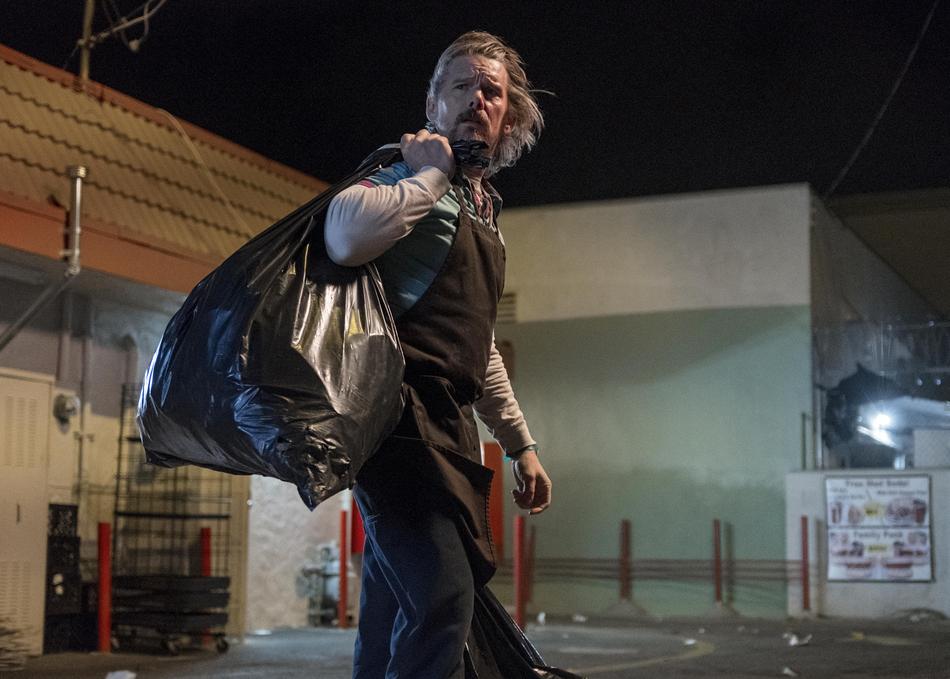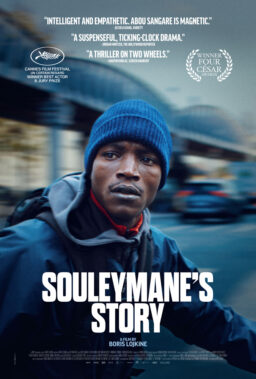Two socially stunted men tried to find themselves on Sunday in world premieres of very different films at the South by Southwest Film Festival. Both protagonists are the kind of men who go through their daily lives with a heady dose of fear. One tries to do something about it; one is thrust into a surprising chain of events by life and forced to adapt.
The better of the two is the directorial debut of “The Invitation” and “Upgrade” star Logan Marshall-Green, “Adopt a Highway.” With yet another anchored, character-driven performance from Ethan Hawke, Marshall-Green’s film has echoes of one of my favorite shows of the ‘10s, “Rectify,” a program about a boy sent to prison and asked to be a man when he’s released. That arc is similar here, as is a slightly off-center, almost quirky tone. Appropriately for a film about the unexpected places we find ourselves on life’s journey, the power of “Adopt a Highway” is cumulative. It’s an odd film, but it greatly rewards viewer patience, culminating in the only scenes at my SXSW so far that brought tears to my eyes.
Russell Millings was a victim of a three strikes law that sent him to prison for 21 years when he was really just a kid. He had an ounce of weed on him, an amount that’s basically legal everywhere now, and was subsequently cut off from a world that should have been teaching him how to grow into a man. Consequently, he’s almost child-like, remarkably fragile and awkward, as if forced to grow up in trauma. Of course, Hawke excels at this kind of emotionally stunted character, finding the humanity in Russ where other actors would have overplayed the archetype of the bitter ex-con.
Russ has a simple life with a job at a fast food burger joint and a lonely room in a motel. One night, after closing up the store, he finds a baby in a dumpster. The beautiful child is accompanied by a note that says only “Her name was Ella.” Russell does not call the cops, which may seem like something unbelievable for a grown man to do but not if you consider that this is basically a stupid teenager in a man’s body. He takes Ella home and he cares for her. He literally doesn’t know any better. He goes to an internet café and Googles if one can keep a baby they find, shocked to learn that it’s frowned upon.
The movie then takes a turn I really wasn’t expecting and almost becomes something else, and I think that’s part of Marshall-Green’s point: major events can come completely out of nowhere and change the trajectory of our lives. Russ was a beloved kid one day and a criminal the next. Everything can be normal and then you find a baby in a dumpster. Chance encounters and events often shape our futures. They sure do for Russ, one of the most unforgettable characters of this year’s South by Southwest.

I won’t soon forget the characters of Riley Stearns’ “The Art of Self-Defense” either, but with less positive shading to my memories. These are broad caricatures, the kind of overdrawn personalities we’ve seen in comedies by Jody Hill and Jared Hess, two other directors interested in how modern men navigate the rocky terrain of modern masculinity. Like both Hill and Hess’ films, this is one in which phrases like “your mileage may vary” are made. There’s a very distinct brand of humor on display in “The Art of Self-Defense,” and it’s one that wore out its welcome for this viewer incredibly early. Whether or not you find the core ideas at play in “The Art of Self-Defense” funnier than I do, I can’t help but think that even fans of this movie will be frustrated by its often slack pacing and repetitive writing. It’s ultimately a piece with funny moments sprinkled throughout but that never comes together in a satisfying way.
Eisenberg leans into his nervous persona with Casey, a lonely accountant who is mocked at work and seems to have no friends outside of his dachshund. After being beaten by a band of motorcycle-riding bad guys one night, he goes to a buy a gun, but stumbles onto a karate dojo nearby at the same time. The studio is run by a walking ego who calls himself Sensei (Alessandro Nivola), the kind of guy who constantly shouts the rules of his studio to his students and pits them against one another. One other teacher is there, played by a relatively-wasted Imogen Poots, but this is Sensei’s dojo, and he inspires Casey to find his inner karate expert. Before you know it, Casey is throat-punching his boss and learning German instead of French because it’s a tougher language. But then he learns that Sensei’s brand of masculinity is toxic.
Clearly, there’s enough ambition in “The Art of Self-Defense” to allow it to stand out. At its best, it reminded me of films like Hill’s “Observe and Report,” another movie that challenges the concept of what makes a guy “tough.” However, there’s something about the rhythm of this movie, including several long scenes of Sensei monologuing, that allows the mind to wander. And this is the kind of film that immediately falls apart if you can’t stay on its wavelength from front to back. Broad comedy is tricky in that if it doesn’t keep you, it can be hard to get you back. To be fair, the final act of this one is so over the top that it won me back to a degree, but mostly just to wish I liked the whole project just a bit more than I did.












